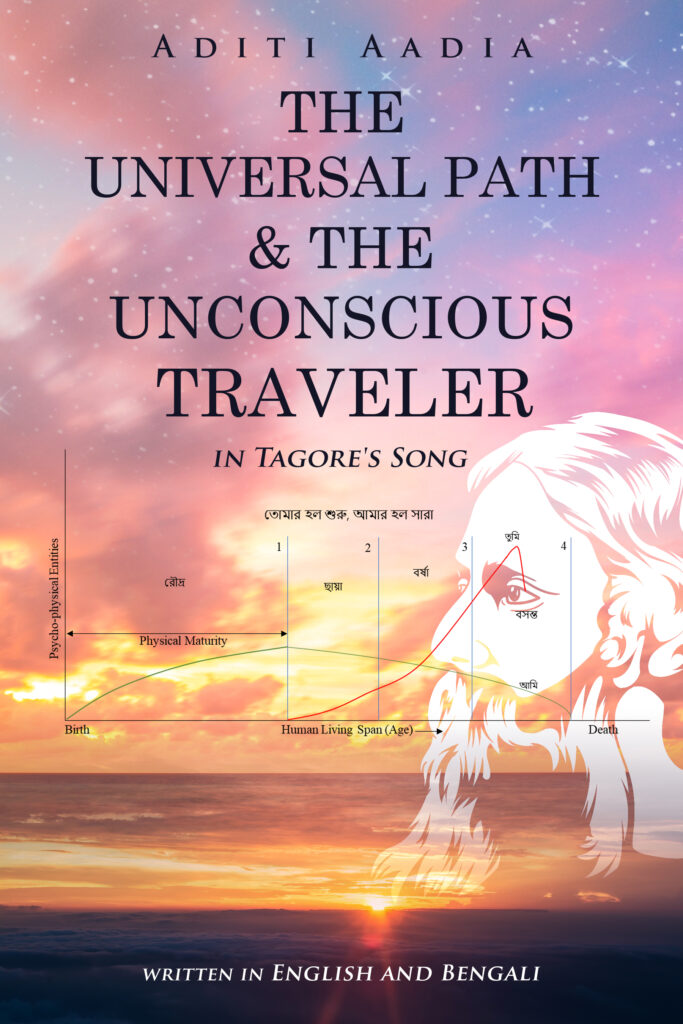
The essence of this composition revolves around the universal message accompanying the “universal path” and the “unconscious traveler” embedded within Tagore’s songs. This message stands independently, detached from Rabindranath as an individual, his personal actions and choices, as well as his literary contributions in other domains. The examination and conclusions drawn herein are exclusively focused on his songs, specifically targeted towards individuals familiar with Rabindra Sangeet (রবীন্দ্রসংগীত). I was profoundly astonished and captivated as I began to discern various facets of the human journey symbolically expressed in his songs from a conscious perspective. I am confident that similar elements can be found in his other literary works, including novels, poetry, dramas, and more. In my understanding, it is a visionary perception that, once realized, cannot be disregarded in any form of literature, especially when it originates from a luminary such as Tagore.
As for myself, despite growing up in a society where Rabindranath Tagore’s influence was pervasive in various facets of life—be it education, social celebrations, Bengali New Year, family environment, drama, poetry, or songs—I never considered myself a fan of his work. Strangely enough, I can’t quite pinpoint why, but I have always lacked interest in his literary creations, particularly his songs, which I even developed a disliking for.
Around three years ago, everything shifted, if my memory serves me correctly. I remember that it happened one evening while I was casually browsing through Facebook. I stumbled upon a post that had a song titled “প্রাণ ভরিয়ে তৃষা হরিয়ে” playing in the background. Without much thought, I started listening to it. Suddenly, a few lines from the song, which I’ve highlighted below, captured my attention. I found myself wondering why Rabindranath Tagore was discussing such profound and introspective themes, reminiscent of scripture or the concept of “know thyself.”
As someone who follows a different religion than Tagore, it was both a delightful and astonishing experience to encounter these elements in his work. Intrigued, I began exploring his other songs in hopes of discovering more messages like those in “প্রাণ ভরিয়ে তৃষা হরিয়ে,” but primarily, I focused on reading his lyrics. To my amazement, as I delved deeper into his songs and gained a better understanding of them, my initial interpretation of the message in “প্রাণ ভরিয়ে” transformed into a more comprehensive and fulfilling perspective.
I began organizing the various elements of the songs, such as You (তুমি), I (আমি), Portrait (ছবি), Spring (বসন্ত), and others, in a format that I could easily comprehend and align. For this book, I selected 117 songs to analyze and included documentation for seventy translations. Now, one might question how a message design or layout can be derived from less than 5% of his vast collection of over two thousand songs. My response to that is, “If a message framework is developed and identified based on these songs, all other relevant songs should align with that framework.” I leave it to the readers to judge accordingly.
I have employed techniques such as entity definition and analysis, allegorical explanations, as well as visual aids such as tables and graphs to define the “Universal Consciousness Model” and the “Universal Unconsciousness Model” for the readers to grasp. What’s truly fascinating and captivating is that we all are familiar with this internal message framework within our memory and experience, regardless of gender, yet we have often overlooked its significance. In this book, I have utilized English and Bengali (বাংলা) to convey my interpretation of the message. Its target audience primarily consists of individuals who possess fluency in both languages, particularly Bengali. Thank you once again for your interest, and welcome to this enlightening journey of recollection and realization!
Buy from Amazon => eBook $9.99 / Paperback $24.99 / Hardcover $34.99
Test